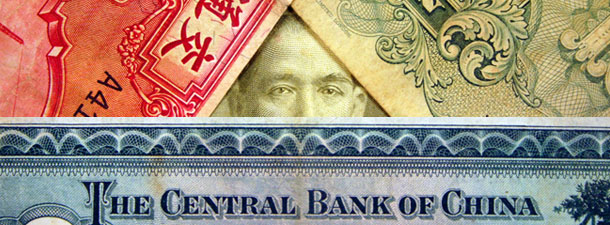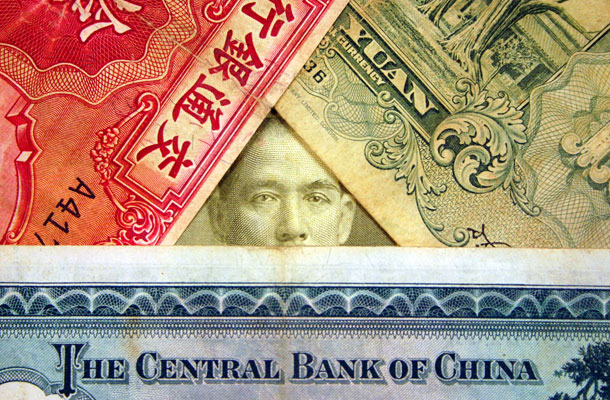
OBAMA, where art thou?
November 4, 2012
He’s Fifty, But He Doesn’t Look It
November 18, 2012Who Holds the Wealth of Nations? China’s sovereign wealth fund and what the world should really worry about.

As the world’s financial meltdown continues, nation states have become more active – and more open – players in international capital markets. This may, or may not, be a problem…

B
By 2050, students will neither be studying the textbooks my generation did in the early 2000s, nor take the same classes. By that time, those books and classes will be explaining the terrible economic crisis of the late 2000s. They will surely also document the rise of emerging economies such as China or Brazil, and the subsequent shifting in the wealth of nations. Finally, they will be giving full coverage to state capitalism, a form of capitalism where the state plays an essential role as both regulator and investor.
These three elements are closely connected: the financial crisis of late the 2000s played out with the substantial intervention of emerging countries via their sovereign wealth funds (SWFs) – government investment vehicles funded by foreign exchange assets, managed separately from official reserves, and owned and/or controlled by governments. In late 2007, Abu Dhabi Investment Authority acquired 4.9% of Citigroup, Government of Singapore Investment Corporation injected $10 billion in UBS, while China Investment Authority acquired 9.9% of Morgan Stanley. Merrill Lynch was given $11 billion by Temasek Holding from Singapore and the SWFs from Kuwait and South Korea, and Citigroup also gained about $12.5 billion in capital. By early 2008, the world realised not only that states are not done meddling with the private economic sector, but they have also the resources to massively invest in high-profile companies. More ominously, among the states having such predeliction and resources are non-democratic countries which have been long-time rivals of Western countries (e.g. Russia), or were deemed to be only future rivals (e.g. China). These countries can now pursue political goals through their investments.

Before the financial turmoil, activism by SWFs was more than welcomed. Corporations were easily able to sort out the investments that SWFs pursued. For example, Dubai Ports World – a company controlled by the Dubai government – dropped its offer to acquire control of terminals in six US harbours as soon as the proposal was publicly announced. Moreover, all countries provide for some form of regulation of foreign direct investments – they filter against “unwanted” investments by providing for some restrictions in delicate sectors such as energy or transportation. With the credit crunch that has come in the wake of the crisis, however, Western countries have been more willing than ever to accept the liquidity offered by SWFs. On the other hand, they have had little choice. As market analyst Jim Cramer said, “Do we want the communists to own the banks, or the terrorists? I’ll take any of it, I guess, because we’re so desperate.” Thus, there are serious concerns that SWF investments come with both benefits and inevitable dangers – the latter including financial volatility, geopolitical implications, and undisclosed spillover policies.
As a result of the rising activity of SWFs, recipient countries have started to revise their regulations in order to address the specific issues of sovereign investments. The lack of a common response portends the danger of a fragmentation that could threaten the legal certainty SWFs need to make their investment choices. Domestic responses range from providing the government with a veto power as to any transaction impairing national security (the US) to establishing a stronger filter against “unwanted” investments (Germany and France), to adopting a relatively open door policy as long as sovereign investments comply with existing FDI rules and restrictions (the UK). In an attempt to reduce this heterogeneity, international organisations have issued some voluntary codes of conduct involving recipient and sponsor countries alike, like the “Santiago Principles” issued by the International Monetary Fund.
Currently, all their assets considered, SWFs manage almost $3.6 trillion, and it has been estimated that these assets will have grown to $10 trillion by 2015. Almost all (but not only) the emerging economies today have some form of sovereign investment vehicle, and that is true also for China, one of the fastest-growing economies. In late 2007, China set up its own SWF – China Investment Corporation (CIC). The creation of CIC reinforced fears that SWFs may have other goals than the maximization of their investments. Indeed, both the lack of transparency in its investment portfolio, and the strong ties with the state and the Communist Party make suspicions about political influence over CIC absolutely legitimate. The geographical distribution of the CIC portfolio and the breakdown by sector and asset classes are not publicly available. Moreover, although CIC is legally distinct from the state and the Party, CIC main bodies – the board of directors and its executive committee, and the board of supervisors – are accountable to the State Council, China’s cabinet, and there is an internal committee representing the Chinese Communist Party. Insufficient disclosure and weak governance, combined with the sovereign status CIC may hold, make many fear that CIC might resort to sovereign immunity doctrine in order to avoid any liability for its conduct.



According to international law, in fact, sovereign entities enjoy a strong immunity against adjudicative jurisdiction, and a full immunity against executive jurisdiction. In other words, international law grants sovereigns with the privilege – while not absolute – of not being sued in court and, more importantly, of having its properties protected against any court order. The applicability of such rules to SWFs is not just a doctrinal speculation. In November 2009, the emirate of Dubai announced a moratorium on payments of the debts of Dubai World, a government-owned conglomerate. At the end of the day, Dubai World was bailed out by Abu Dhabi, but legal professionals suggest that if a solution had not been found, Dubai World could have invoked states immunities doctrine.
While these fears are legitimate in theory, they should be tested case by case. In evaluating their regulatory response to SWFs, host countries should be mindful of the reason underlying an SWF’s creation. That includes CIC, as well. CIC is a forex sovereign wealth fund. That is, it is an institutional investor whose sources of funding come from both current and capital account surpluses of the sponsor state. In the Chinese experience, these surpluses are the ultimate result of both the export-led growth strategy and the promotion of inward FDI carried out since the late 1970s, coupled with the managed exchange rate system. What is noteworthy about CIC is that currency reserves are not only the source of funding of CIC, but also the main reason for setting up the latter. Indeed, in order to keep the exchange rate fixed and prevent an appreciation of the renminbi (China’s currency), the Chinese central bank has to buy foreign currencies by injecting domestic currency into the Chinese economy. In order to cope with this excessive liquidity that could cause an overheating of the economy with the risk of a sudden crash, Chinese monetary authorities have decided to reduce the accumulation of foreign reserve by investing in domestic and foreign companies.
Thus CIC could be considered as the international complement of Chinese domestic economic reforms, since the “Go Global” policy, corollary of Deng’s Open Door Policy, is indeed a two-prong economic strategy, consisting in a “Bring In” and “Go Out.” From this perspective, CIC and its investments should be seen as part of the economic reforms China has been carrying out. Since Deng Xiaoping launched the Open Door Policy in 1978, these reforms have been sweeping (banking, securities markets, price system, taxation rules, and corporate structure, among others, were affected). The main goal was to make China appealing for foreign direct investments, in order to bring into the country the capital necessary to promote export-led growth. Law played a pivotal role in this, as Deng made it clear that legal certainty was one of the fundamental means to achieve this goal. In order to attract FDI, the Chinese legal system decided to segregate them from the rest of the country from a legal point of view by creating the Special Economic Zones, which are characterised by commercial and tax laws totally different from the rest of the country, and where foreigners enjoy the legal protection they need.
At the end of the 1990s this segregation started to fall apart as China was successful in building a modern legal system, but even so, such a system displays some structural weaknesses. The two paramount weaknesses relate to the sources of law and the question of judicial power. While the former has lacked a clear hierarchy among sources until the early 2000s, the latter is still without the independence necessary to carry out its tasks effectively and credibly. With Chinese GDP skyrocketing in the past three decades and the legal system thus weakened, the economic performance and legal system remain dissociated from each other.
It could be argued that international law plays the same ancillary role of promoting economic development. In that respect, two features of China’s involvement in the international legal system are particularly meaningful: the legal consequences of China’s accession to WTO, and the PRC views on the reception of international law into domestic law.
As to the former, it is noteworthy that China used WTO accession as a means to secure its domestic reforms programme. Indeed, the Chinese leadership anticipated the reforms that WTO accession would require by overhauling its legal system well before such accession became effective, amending thousands of acts of law of various kinds. As to the latter, China appears to consider domestic law as a filter against international legal rules, as treaty obligations are applied through a specific national law and not directly through a general mechanism of adaptation. This feature is further complicated by the fact that Chinese views vary by subject matter, as such provisions exist for some subjects, but not for others.
With specific reference to China’s view on state immunities, it must be noted that such views have shifted in the past twenty years. China’s approach was quite rigid. In recognising the traditional principle of the jurisdictional immunity of states, China claimed that such immunities are absolute and know no exception. However, such assertions were made in a time when no one could imagine that sovereign states would play an important role as private actors in the international economic order. Nowadays, there is a rationale for a shift towards accepting a restrictive theory of sovereign immunity.
While Chinese attitudes towards international law may legitimise host states’ fears, on the other hand these fears should be balanced by the awareness of the role that CIC plays in China’s economic growth. As China is moving its pieces on the chessboard of the international economic order, policymakers in the recipient countries should bear in mind that China’s peaceful rise – its pursuit of the socio-economic development of its own people – is maybe the main concern of the country’s leaders.



With this in mind, host states should deal with SWF investment issues in a bilateral investment treaty with the sponsor state, explicitly addressing the possibility of recourse to state immunities by states sponsoring SWFs, and regulating such recourse by providing for specific rules. Such structured bilateral investment treaties promote legal certainty needed by host states and sponsor states alike in order to make their investment decisions, thereby fostering efficient allocation of financial resources among countries. This is advisable especially for China and the US, since the two countries, forming the so-called Group of Two, seem to be involved in a sort of “frenemy” relationship. The US may be complaining about the lack of transparency in CIC operations, but it needs China not to drop its huge number of U.S. Treasury bills. China, for its part, needs to promote its investments abroad as a way to stabilise its economic growth. An overheating of the Chinese economy, followed by a hard landing, would jeopardise not only Chinese growth potential or the U.S. debt position, but also the global economic outlook as a whole – a risk that the current global macroeconomic situation does not tend to allow.
By 2050, students will be studying how the late 2000s financial crisis and state capitalism will have changed the world. Regulators and legislators should help the future authors of those books to write a happy ending.




